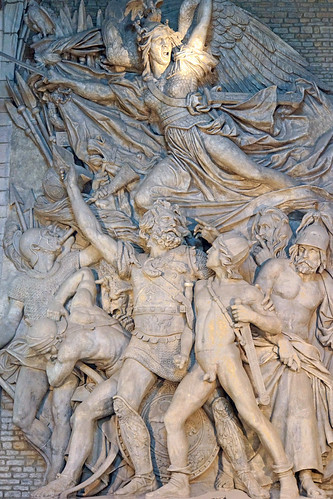‘Aux armes et caetera’: The Serge Gainsbourg song that earned him death threats
La Marseillaise #LaMarseillaise

(Credits: Far Out / Claude Truong-Ngoc)
Music Wed 6th Sep 2023 21.00 BST
Serge Gainsbourg remains one of the most iconic French musical figures of all time. While he possessed so much stereotypical Frenchness that it often bordered on parodical, you can’t fault his talents, with Gainsbourg creating some of the greatest albums of the 1960s and 1970s.
The chainsmoking provocateur represents a period of musical history that seems so far removed from today. He was an unconventional sex symbol known for his relationships with beautiful women such as Brigitte Bardot and, most famously, Jane Birkin. Although he wrote his most well-known hit, ‘Je t’aime…moi non plus’ for Bardot, he found worldwide success when he sang it with Birkin. The infamous song contains incessant sexual moaning, making it one of the most widely banned songs ever made.
The song appeared on the 1969 album Jane Birkin and Serge Gainsbourg as well as becoming the title of a 1976 erotic movie directed by Gainsbourg and starring Birkin. Within the film, Birkin plays a boyish woman who becomes the object of a gay man’s affection. It was not received well. Throughout Gainsbourg’s career, he continuously caused controversy, and it’s hard to believe he would get away with half of his behaviour if he were around today.
One of the most genuinely shocking moments of his career came in 1984 when he recorded a duet with his daughter, Charlotte, named ‘Lemon Incest’. In the song, the 12-year-old sings lines like “The love we will never make together is the most beautiful, the most violent, the purest”. The music video wasn’t much better, with the pair lying in bed together, with Gainsbourg half-naked.
However, that’s not the incident that led to Gainsbourg receiving death threats. It was something much less controversial that resulted in outrage – his reggae-fixation of the French national anthem. In 1979, he had the idea to transform ‘La Marseillaise’ into a reggae track called ‘Aux armes et caetera’, angering many patriotic French citizens in the process. He even received threats from soldiers willing to beat him up if he ever played the song in concert.
When he did attempt to play the song on one occasion, his performance was interrupted by protestors from the French Army. In response, Gainsbourg kept playing, stating, “The true meaning of our national anthem is revolutionary.”
The French embassy still has a notice on its website stating, “Late controversial singer and composer Serge Gainsbourg tried to rewrite the Marseillaise his own way in 1979 by having the national anthem played by a reggae band. The reception was less than stellar: A group of legionnaires threatened to give him a hard time if he performed his new version in public. Gainsbourg did sing the Marseillaise, but a cappella. One cannot tamper with that which is sacred!”
Listen to Gainsbourg’s song below.
Most popular
{{#.}} {{#articles}} {{#title}} {{/title}} {{/articles}} {{/.}}